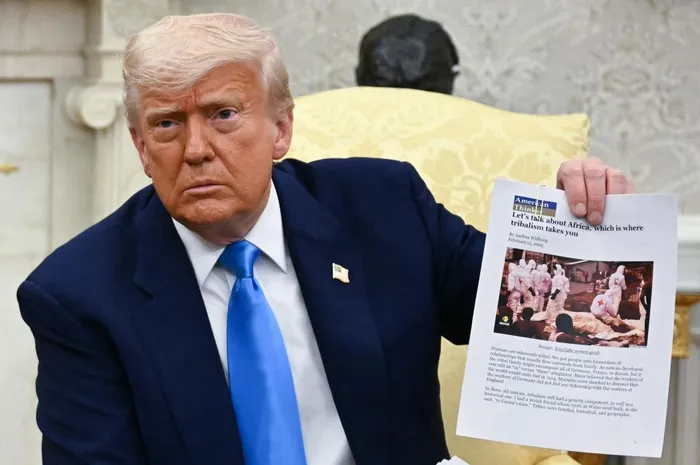Editor's Note: Houston, we have a crisis: The ‘Afrikaaner genocide’ myth and the real threat to SA’s reputation
EDITOR'S NOTE

President Donald Trump has called for the arrest of South African opposition leader Julius Malema, accusing him of inciting violence against white farmers.
Image: AFP
“Houston, we have a problem.” The iconic Apollo 13 line feels oddly fitting for South Africa’s latest headache: the “Afrikaaner genocide” narrative making waves in US-South Africa trade talks.
This exaggerated claim, fueled by images of crosses symbolising farm murders, paints a distorted picture of crime in South Africa, ruffling feathers globally. It's a headache for the country's reputation overshadowing its “Rainbow Nation” legacy.
To navigate this storm, South Africa must confront the misinformation head-on while addressing the root causes - crime, unemployment, and governance failures - with decisive action.
The “Afrikaaner genocide” narrative gained traction during the recent White House meeting, where US President Donald Trump presented video clips of Economic Freedom Fighters (EFF) leader Julius Malema chanting “Kill the Boer,” an apartheid-era struggle song.
The South African delegation, led by President Cyril Ramaphosa, dismissed the EFF as a minor political party, but the damage was done. The chant, paired with images of white crosses, reinforced a narrative of targeted violence against Afrikaners, sticking in the global imagination.
At the Google Zeitgeist event in London last weekend, I faced questions from business leaders about this so-called “genocide”. I was amused by how misinformation travels - yet frustrated by its persistence. This distortion, like a comedic skit flipping tragedy into exaggeration, stems from a real issue: South Africa’s massive crime problem.
Crime in South Africa is severe but not genocidal.
Police Minister Senzo Mchunu set the record straight at the latest crime stats release on Friday. From January to March 2025, South Africa saw 5 727 murders (62 daily), 10 688 rapes, and 4 571 kidnappings. These numbers are grim but cut across all communities - not a targeted “genocide”. Mchunu debunked a viral image of crosses in KwaZulu-Natal, tied to a 2020 farm murder case where justice was served, with suspects convicted.
"We have respect for the USA as a country, we have respect for the people in that country and for President Trump, but we have no respect for this genocide story – at all. It is totally unfounded and unsubstantiated."
He further said, "We do not deny that the levels of crime in the country are high – we are very concerned. Crime cuts across all divides. We are currently intensifying the fight against crime and criminals. The crime states we are presenting today will show progress; we commend and encourage the SAPS (South African Police Service) to fight on and harder. We will win."
Despite these clarifications, the narrative persists, amplified by global figures like Elon Musk, who has claimed on X that South Africa promotes “white genocide” and that his Starlink service was denied a license due to his race. This misinformation travels fast and sticks, overshadowing South Africa’s broader crime crisis, which is tied to a 31.7% unemployment rate (Q1 2025) and systemic inequality.
The economic backdrop makes addressing crime even tougher. The recent Budget 3.0, finalised after two failed attempts, slashed R68 billion in spending over the medium term and downgraded 2025 GDP growth to 1.4% (from 1.9% in March). This fiscal squeeze, reflecting a “bottom-of-the-barrel” economy, limits resources for policing and job creation.
The budget process itself, marred by political wrangling, underscores South Africa’s reputation as an “extended talk shop” where rhetoric often trumps action. This perception of inaction feeds into the global narrative, making it harder to counter the “genocide” label and attract investment.
Worse, the trade talks exposed another complication: the proposed Starlink deal. Reports suggest the government may bypass Black Economic Empowerment (BEE) laws through “equity equivalent” arrangements, allowing Starlink to invest in development projects instead of ceding equity. This move, while pragmatic, risks undermining BEE - a cornerstone of post-apartheid transformation designed to redress historical disparities.
Bending rules for a high-profile figure like Musk could signal to investors that South Africa’s legislative framework is flexible, eroding trust. For example, the MultiChoice-Canal+ deal adhered to BEE. If BEE is sidestepped, what message does this send? That the policy is negotiable? This opens a can of worms, threatening the consistency investors crave and potentially undermining the spirit of South Africa’s post-apartheid vision.
This governance inconsistency ties into a broader issue: accountability. The Zondo Commission, costing millions, exposed State Capture corruption, yet few prosecutions followed, fostering perceptions of impunity.
To rebuild trust, I propose fast-tracking mandatory lifestyle audits for all government officials and political leaders - 37% of Gauteng’s senior officials recently failed such audits. Suspending officials under investigation until cleared could further deter corruption. These steps, though, require political will, which has been lacking in a system where committees often produce “hot air” instead of results.
Ultimately, South Africa’s “Afrikaaner genocide” narrative is more than a diplomatic headache - it’s a wake-up call. While the country's brightest need to put their heads together to whittle away at the crime conundrum, more needs to be done on every level for South Africa to reclaim its Proudly South African shine.
Houston, we have a problem - but it’s not unsolvable. South Africa’s challenge is to reclaim its narrative through tangible action: robust crime reduction, economic revitalisation, and transparent governance. The “Afrikaaner genocide” label, threatens to derail progress, but with strategic focus - clear policies, accountability, and global engagement - South Africa can realign its trajectory. A united, action-oriented approach can restore the nation’s shine as a beacon of resilience, not a caricature of chaos.
Visit: www.businessreport.co.za

Philippa Larkin, is the executive edior of Business Report.
Image: Supplied
Philippa Larkin is the executive editor of Business Report.
BUSINESS REPORT